What would you do if this was your home, your family and your life?
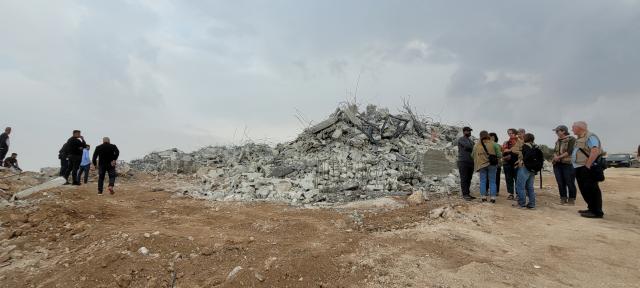
Imagine you are sitting in your home and the military arrive with a bulldozer and give you 30 minutes to remove your belongings before they demolish your home.
Why?
Well, it may be that the land your home is on has been confiscated by the state.
Maybe it is because you have built the home without a permit, maybe your home is on that land you cannot prove you own as it has been in the family for generations.
Maybe you have been given some warning that your home is going to be demolished and you never received it. Maybe it was written in a language and you don’t speak or read.
Maybe you have retained a lawyer to argue the demolition document however you home is demolished before your court case is heard.
Maybe your home is on land designated for a firing zone so that the military can train.
You live in an occupied territory however the occupier ignores the International Humanitarian law that is supposed to protect your home and your personal possessions.
When I first arrived in Bethlehem, I had the opportunity to meet with a community who wanted to report demolition of a home in their village.
The following are three stories of families whose homes where demolished by the military
The A. Family Home
This took place in a village in occupied Palestinian territory in the West Bank, a short distance from Bethlehem.
The home of the A. family (two adults three children) was demolished in the early morning of November 2, 2022. Ten military vehicles and two bulldozers arrived to carry out the demolition. military soldiers told the family to remove their belongings from their home immediately. The military then closed off all roads leading to the home so none of the community could assist the family. The military then carried out the demolition.
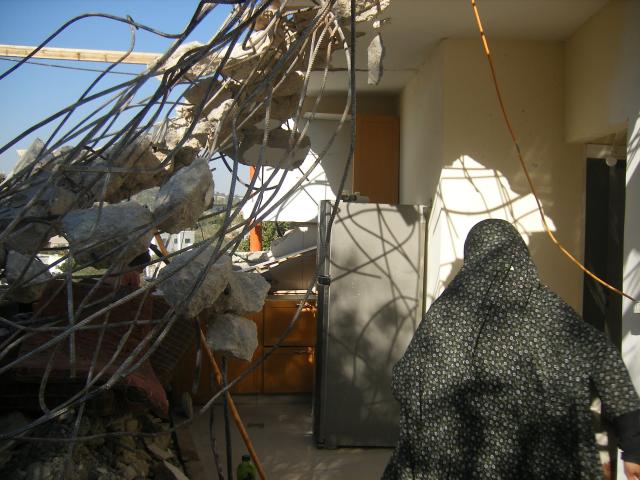
A member of the village reported this demolition two days after the event. I was among a group of international observers who attended the scene and saw the ruble that was once a home. However, there was a small portion of the building that was left standing in the midst of cut wires, broken concrete blocks, and rebar debris. To our surprise a woman and a small child exited this exposed structure. The owners of the mostly destroyed home reconnected some water and electricity and continued to live in this structure. With the help of an interpreter, Mrs. A. told her story while summoning her son to get us some chairs to sit on. It was unclear to her why a part of the home was left standing. There was some suggestion that the family had added an addition to the home without a permit. The military only took down the addition to the home however soldiers advised the family that they themselves would need to demolish the rest of the house at their own expense as it no longer met the building code standards. The most heart-breaking part of the story was the five-year-old daughter who said "I don't want to live in this world anymore."
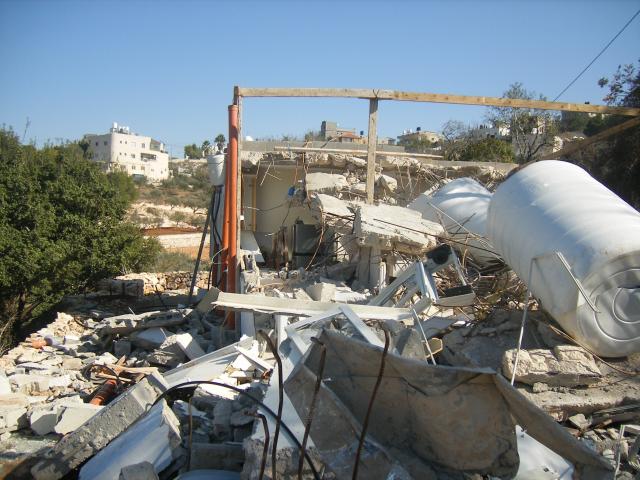
The K. Family Home
The second home demolition was in a town in occupied Palestinian territory in the West Bank on November 14, 2022.
At 8.00 a.m. five bulldozers, at least 17 soldiers on foot, and multiple army and police vehicles were observed leaving the village. Ecumenical Accompaniers were contacted and advised that three newly built homes (the families who built them were to move into the following week) had just been demolished. We visited the site and met the owner, Mr. K., his brother, and other family members.
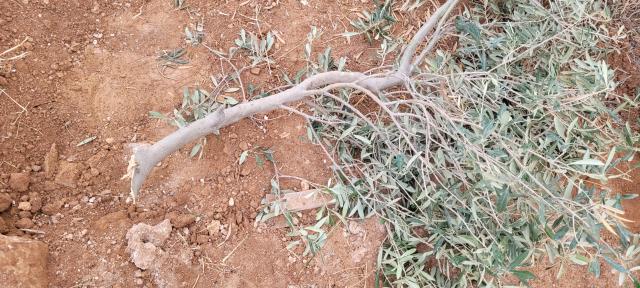
Mr. K. had been building these three homes on his land overlooking the beautiful Palestinian landscape. The three homes would accommodate his family, consisting of parents, grandmother, aunt, and six children aged two months to 14 years old. It was not just the homes that were demolished, but also the swimming pool, the cistern for water storage, trees were uprooted, and irrigation pipes were cut.
The cost of building these three homes was over $1,500,000 US and 50% was mortgaged. Mr. K. was building these homes without a building permit and had been told last year that they were under a demolition order. The Israel Civil Administration rarely, if ever, provides Palestinians with Building Permits in Area C which under total and military control of Israel.
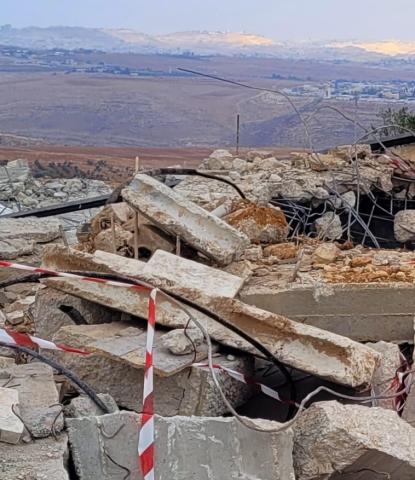
Palestinians who legally own the land are faced with no option but to build a new home or renovate an existing home without a permit. The denial of a permit provides the Israeli state with a reason to demolish the Palestinian’s homes. If, due to the refusal of a permit, Palestinians do not build on their land or renovate their homes and are forced to leave the area, their land can be confiscated by the Israeli state which considers the land abandoned.
Mr. K. is quite adamant that he will rebuild. He says it is his land and he needs to provide a home for his family.
The Abu S. Family Homes
While visiting, the mayor of Bethlehem he received a call that there was a home demolition taking place at a village on the hill below an illegal settlement. As the military vehicles had blocked all road access to the home to be demolished, Ecumenical Accompaniers observed from the other side of the valley where we had a clear view of the activity. We arrived at 9:30 am.. There were approximately seven people in yellow and orange vests removing personal belongings from the home. We were told that the military hire people to assist the home owner in removing their personal belongings to make things go quickly. We counted four military jeeps, one DCO (District Coordination Office) vehicle, two bulldozers, and approximately 16 armed soldiers.
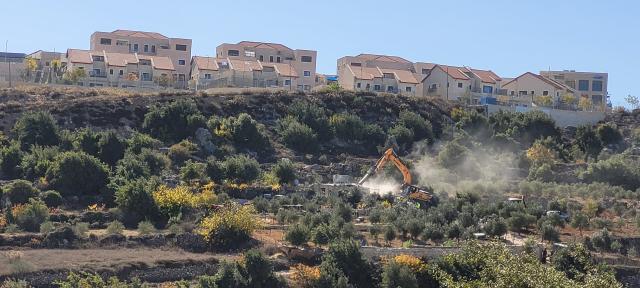
As we were watching this activity a man, Abu S., approached us. Abu and his family lived in the house behind where we were standing. He advised us that the home being demolished belonged to his cousin. There were 15 members of the family that were living in the home (eight adults and seven children). The land on which the illegal settlement was constructed was confiscated from the village. The house was the last Palestinian home on that side hill below the illegal settlement. The demolition started at 10:20 a.m. and was complete rubble by 10:52 a.m.
Abu's wife brought coffee for those witnessing in solidarity. When the military departed, we left to express our condolences to the family and Abu joined us.
The family was sitting in the shade of a grove of trees in total shock. One woman had a baby in her lap. Abu went to speak with his family and we started to walk through the rubble to give them some privacy. Suddenly three men came rushing after us saying the military was at Abu's house preparing to demolish it. (This was the home where we just had coffee.)
We rushed Abu back to his home. The road to Abu's home was blocked by the military and only Abu was permitted to enter. When the four military vehicles, the bulldozer, and soldiers left we proceeded to Abu’s demolished home.
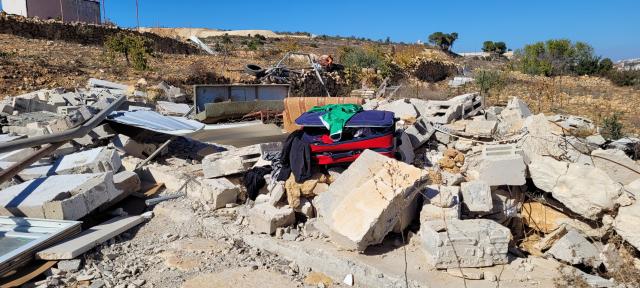
There are eight members of the family living in the home including four children who were in school at the time of the demolition. The home was completely demolished with no clear indication if any time was permitted for personal belongs to be removed. This is the fourth home on Abu's property that has been demolished. One is 2019, one in 2020, one two months ago, and now this one.
What would you do if this was your home, your family and your life?
— by EA Susan
The World Council of Churches’ Ecumenical Accompaniment Programme in Palestine and Israel (EAPPI) is an initiative under the WCC’s Ecumenical Campaign to End the Illegal Occupation of Palestine: Support a Just Peace in the Middle East. Its mission is to accompany churches in Israel and the Occupied Palestinian Territories in their non- violent actions and concerted advocacy efforts to end the occupation and support a just peace in the Middle East. Participants of the programme monitor and report violations of human rights and international humanitarian law, support acts of non-violent resistance alongside local Christian and Muslim Palestinians and Israeli peace activists, offer protection through non-violent presence, engage in public policy advocacy and, in general, stand in solidarity with the churches and all those struggling against the occupation.
More information on the EAPPI and regular updates from the Ecumenical Accompaniers are available on their website.
The views contained within these blogs are personal and do not necessarily reflect those of The United Church of Canada.